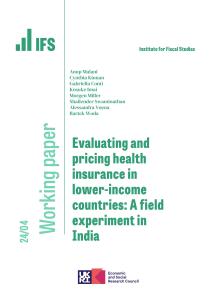We use Oportunidades, a conditional cash transfer to women, to show that standard demand models do not represent the sample's behavior: Oportunidades increases eligible households' food budget shares, despite food being a necessity; demand for food and high-protein food changes over time only in treatment areas; the treatment effects on food and high-protein food consumption are larger than the prediction from the Engel curves at baseline; and the curves do not change in eligible households with high baseline bargaining power for the transfer recipient. Thus, handing transfers to women is a likely determinant of the observed nutritional changes.
Authors

CPP Co-Director
Orazio is an International Research Fellow at the IFS, a Professor at Yale and a Research Associate at the National Bureau of Economic Research.

University of Arizona
Journal article details
- Publisher
- American Economic Association
- Issue
- February 2013
Suggested citation
Angelucci, M and Attanasio, O. (2013). 'The Demand for Food of Poor Urban Mexican Households: Understanding Policy Impacts Using Structural Models' (2013)
More from IFS
Understand this issue

If you can’t see it, you can’t be it: role models influence female junior doctors’ choice of medical specialty
24 April 2024

Retirement is not always a choice that workers can afford to make
6 November 2023

How did parents’ experiences in the labour market shape children’s social and emotional development during the pandemic?
1 August 2023
Policy analysis

Three ways to improve the design of the UK’s overseas aid spending target
18 January 2024

Distributional analysis of Ghana’s tax system
18 December 2023

Progression of nurses within the NHS
12 April 2024
Academic research

Evaluating pricing health insurance in lower-income countries: A field experiment in India
14 March 2024

Saving by buying ahead: stockpiling in response to lump-sum payments
2 February 2024

Labour market inequality and the changing life cycle profile of male and female wages
15 April 2024